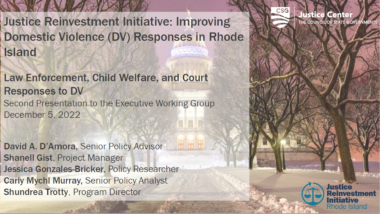
Executive Working Group Meets to Discuss Law Enforcement and Legal Responses to Domestic Violence in Rhode Island
Since October, staff from the CSG Justice Center has supported the Rhode Island Domestic Violence Executive Working Group in a bipartisan, interbranch Justice Reinvestment Initiative to improve domestic violence responses in the state. On December 5, the group met for the second time, and CSG Justice Center staff presented analyses of Rhode Island’s law enforcement, child welfare, and court responses to domestic violence.
The analyses highlighted at the meeting were informed by interviews, surveys, focus groups, and quantitative analysis of more than 96,000 files from the Rhode Island Domestic Violence Training and Monitoring Unit and the Rhode Island Judiciary. Key insights were as follows:
- In Rhode Island, an average of about 7,860 domestic violence incidents are reported to police annually. In nearly half of cases (48 percent) each year, the victim was physically assaulted. Among these incidents, approximately 76 percent of victims are women.
- Though municipal police departments undergo standardized domestic violence training, such training does not exist for Department for Children, Youth & Families (DCYF) staff or people working in the court system.
- Individuals who were interviewed and surveyed, including victims and survivors, reported inconsistent responses across law enforcement, DCYF, and court systems. Inconsistencies uniquely impact people who do not speak English; are Deaf, DeafBlind, or Hard of Hearing; are not White; are LGBTQ+; or who identify as having a disability.
- Data collection and collaboration issues among agencies challenge coordinated responses to domestic violence.
To learn more about how judges, prosecutors, and DCYF caseworkers make decisions related to domestic violence cases, CSG Justice Center staff will conduct additional focus groups prior to the next presentation, which will be held on January 18, 2023. Policy and practice recommendations will be available in the spring of 2023.
This project was supported by Grant No. 2020-ZB-BX-0022 awarded by the Bureau of Justice Assistance. The Bureau of Justice Assistance is a component of the Department of Justice’s Office of Justice Programs, which also includes the Bureau of Justice Statistics, the National Institute of Justice, the Office of Juvenile Justice and Delinquency Prevention, the Office for Victims of Crime, and the SMART Office. Points of view or opinions in this document are those of the author and do not necessarily represent the official position or policies of the U.S. Department of Justice.
About the author

Arkansas policymakers have long expressed concerns about the state’s high recidivism rate. Over the past 10 years, an…
Read MoreIn April 2025, Arkansas Governor Sarah Huckabee Sanders signed a package of bipartisan criminal justice legislation into law,…
Read More Explainer: Key Findings and Options from Arkansas’s Justice Reinvestment Initiative
Explainer: Key Findings and Options from Arkansas’s Justice Reinvestment Initiative
Arkansas policymakers have long expressed concerns about the state’s high recidivism rate. Over the past 10 years, an estimated 72 percent of prison admissions in the state involved people who were revoked from supervision, with unmet substance use and mental health challenges playing a significant role in these failures.
Read More Explainer: How a New Law in Arkansas Tackles Crime, Recidivism, and Community Supervision Challenges
Explainer: How a New Law in Arkansas Tackles Crime, Recidivism, and Community Supervision Challenges
In April 2025, Arkansas Governor Sarah Huckabee Sanders signed a package of bipartisan criminal justice legislation into law, which is designed to increase public safety and improve community supervision. The legislation passed nearly unanimously.
Read More










